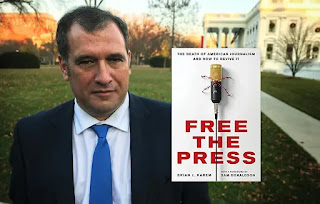For these outlets the transition to digital has been painful but successful. In other efforts, recurring revenue models are driving the success of independent news outlets as well as individual journalists on Substack and similar platforms.
While romantics, like my guest Brian Karem rap quixotic about the 23 newspaper that once were available in New York, news websites and Twitter have now subsumed that, while new sites start up regularly with lower barriers to entry. In his new book Free The Press,
Brian Karem argues that journalism, particularly local journalism, is dying and that he has a specific, if very traditional formula to save it.
My conversation with Brian Karem:



